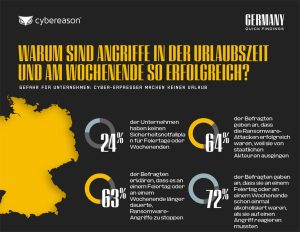
Cybereason study: The risk of falling victim to ransomware is particularly high for companies on weekends and during vacation periods. Longer response times and higher sales losses are the result of the gap between the perceived threat situation and the countermeasures taken.
Cybereason, the leader in future-proof protection against cyberattacks, today published a study in which more than 1.200 security experts at companies worldwide who had already experienced a successful ransomware attack on vacation or on a weekend were asked.
Hackers don't go on vacation
The study, titled "Organizations at Risk: Ransomware Attackers Don't Take Holidays," shows that the vast majority of security professionals expressed great concern about impending ransomware attacks. At the same time, nearly half of respondents feel they don't have the right tools to successfully defend against them. Additionally, almost a quarter (24%) still don't have dedicated plans in place to ensure a rapid response over weekends and holiday periods — despite having been the victim of a ransomware attack.
Ransomware: The Consequences for Businesses
The lack of preparation for ransomware attacks on weekends and during the holiday season has a significant impact on the affected companies:
- 60% of respondents said it took longer to assess the extent of an attack.
- 50% reported that they needed more time to adequately respond to the threat.
- 33% said it took them longer to fully recover from the attack.
- 12% of respondents said that their company suffered a decline in sales as a direct result.
This research confirms the belief that it takes longer to evaluate, contain, fix, and recover from a ransomware attack during vacation time or weekend.
Technological barriers
The gap between risk perception and preparedness for these attacks is huge: Although 89% of respondents said they were concerned about attacks on weekends and holidays, a full 49% said their business could have been attacked by ransomware because they Were not well prepared and not using the right security solutions. Only 67% of the companies were using a NextGen Antivirus (NGAV) solution at the time of the attack, 46% had a traditional signature-based antivirus (AV) solution and only 36% had an Endpoint Detection and Response (EDR) solution.
The human factor
A full 86% of respondents said they had missed a vacation or weekend because of a ransomware attack - a situation that can affect employee job satisfaction.
One surprising finding from the study is that 70% of respondents admitted that reacting to a ransomware attack during a weekend or vacation, they were drunk - a risk factor that many organizations may not have considered when planning.
Retail and transportation: industries in the crosshairs
As the holiday season begins, the retail and transportation sectors are worthwhile targets for ransomware attackers as the potential for disruption and lost sales increases pressure on victims to pay higher ransom demands.
Key findings for these areas include that nearly 70% of retail and transportation companies reported that a previous ransomware attack compromised them because they did not have the right security solutions in place. In addition, 24% reported that their company still does not have a specific contingency plan to deal with the risk of attacks on weekends and during vacation periods in a timely and effective manner.
Study shows cyber criminals don't go on vacation
“Cyber criminals don't take vacations. The most dangerous ransomware attacks in 2021 happened on weekends and during major holidays. That's when the attackers know they have an advantage over the targeted companies," said Lior Div, Chief Executive Officer and co-founder of Cybereason. “This study proves that organizations are underprepared and need to take additional steps to ensure they have the people, processes and technology in place. This is the only way they can respond effectively to ransomware attacks and protect their assets during this critical time.”
More at cybereason.com
About Cybereason Cybereason offers future-proof protection against attacks by means of a uniform security approach, across all endpoints and across the company, wherever the attack scenarios are relocated. The Cybereason Defense Platform combines the industry's best detection and response methods (EDR and XDR), next generation antivirus solutions (NGAV) and proactive threat hunting to provide contextual analysis of every element within a Malop ™ (malicious operation). Cybereason is a privately held international company headquartered in Boston with customers in over 45 countries.

